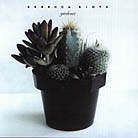December 2000
The group is named for an 1843 social movement in South Wales. To fight an oppressive system of tolls levied under the Turnpike Trusts, people organized and dismantled the tollgates under cover of night. They dressed in women's clothing and claimed the identity of "Rebecca and her daughters" after the Old Testament matriarch who asserted that the people "possess the gates of those which hate them" (Genesis XXIV, 60). Troops were sent to protect the tollgates, and the resulting conflicts were dubbed "the Rebecca Riots." According to the band’s website, "Lisa and Andrea chose the name because it suggests grassroots, nonviolent, women-identified activism that the band supports in various ways, especially with their music." Lisa Zeiler sings and plays lead, rhythm, and slide guitar and mandolin; Andrea Prichett also sings and plays harmonica. Rounding out the trio is Eve Decker, who sings and plays rhythm and lead guitar. All three write songs. Other musicians play drums, bass, and cello on the recording, lending richness to its sound. The group avoids the preachy, maudlin, or frantic qualities often found on recordings by people who believe they are putting forth deep messages. While there is much that is fresh and original in their songs, Rebecca Riots is not politically radical. Most of the band’s material appears at first to fit into the love-song category. But when you listen to the whole songs, you'll notice that personal matters merge with spiritual ones. The CD's title song is a good example, "If I want the suffering all around me to subside/I have got to be more conscious of the things I do and don’t do." The strongest case one can make for the songs’ being political is probably the opening track, "Gentle Rebellion," which begins, "It’s not about keeping silent/When you know there’s something wrong/No one wants to start a confrontation/But it doesn’t help to simply walk away." The song’s "gentle rebellion" consists of living in dignity and speaking out when something is wrong, but that is not so much a political message as a spiritual one: It addresses the individual’s place in the universe, not political figures, structures, ideas, or activities. In politics, one does, in fact, "start a confrontation." Other songs mention "our culture’s obsession with things," a "thin old man" who "slept last night in People’s Park," and additional aspects of today’s cultural landscape. The three songwriters maintain that the personal is political and the emotional is social, even in their love songs. Some people may find political messages in these lyrics, but I maintain they are not, in fact, political. This distinction is important, not because of some notion on my part that folk music should be political -- most is not -- but because I believe it would be unfortunate for anyone to think he or she is taking part in political activities when simply engaging in enriching, spiritually oriented pursuits that have little or no direct effect on public affairs. That noted, Gardener is very much worth listening to, and I hope to hear Rebecca Riots’ other three CDs as well. GO BACK TO: |
 Rebecca Riots - Gardener
Rebecca Riots - Gardener![[Reviewed on CD]](../format/regcd.gif) The
acoustic folk trio Rebecca Riots has created four CDs, but the fourth, Gardener, is
the first one I’ve heard. That says more about the industry’s failure in recent
years to promote folk music than it says about the quality of the available music, for
this group records intelligent and interesting songs with appealing vocal harmonies and
thoughtful arrangements that support the lyrics without overwhelming them.
The
acoustic folk trio Rebecca Riots has created four CDs, but the fourth, Gardener, is
the first one I’ve heard. That says more about the industry’s failure in recent
years to promote folk music than it says about the quality of the available music, for
this group records intelligent and interesting songs with appealing vocal harmonies and
thoughtful arrangements that support the lyrics without overwhelming them.